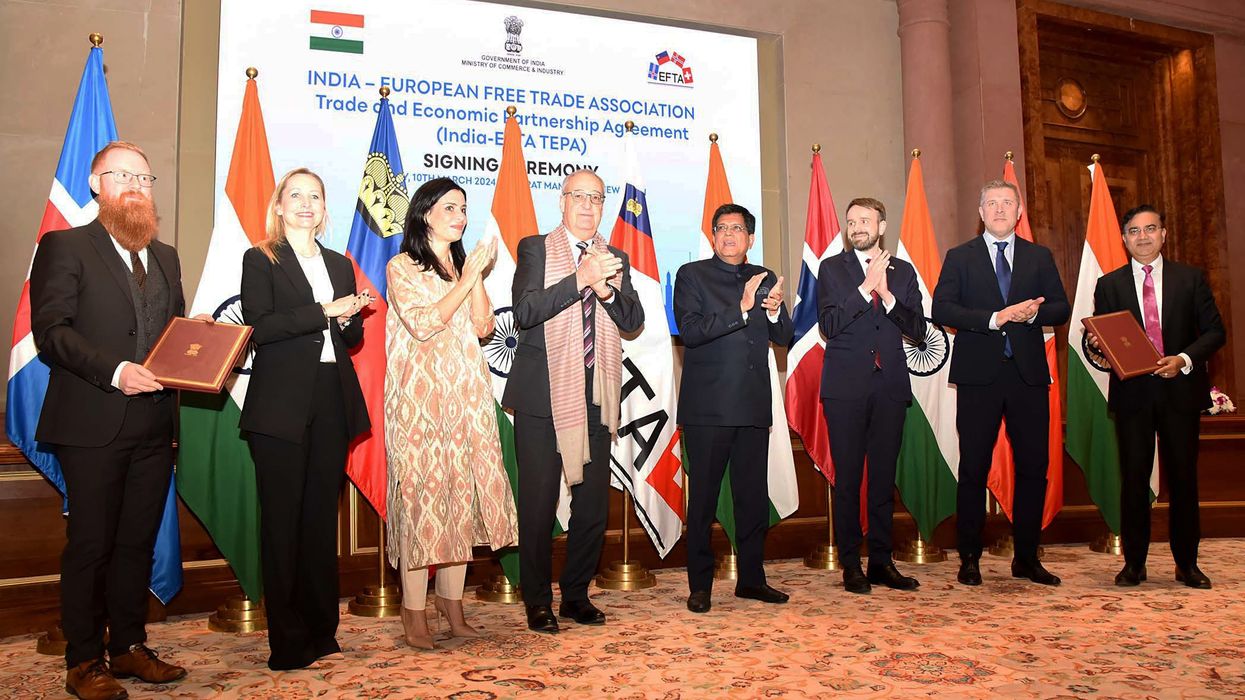INVESTMENTS in India by Swiss companies such as engineering group ABB and transport firm Kuehne+Nagel are on the rise, with a $100 billion (£78.5bn) regional trade deal expected to further open it up to businesses long geared towards China.
India’s appeal has already reflected a broader shift among businesses in Europe eager to balance the costs of a USChina trade spat and recognition that the Chinese economy is, by comparison to India, losing steam.
But the trade and economic partnership (TEPA) signed in March with the European Free Trade Association, whose biggest member is Switzerland, is likely, when ratified, to provide an extra incentive to Swiss investment as it will slash tariffs on exports from chocolates to watches and machinery.
Under the deal, EFTA – whose other members are Norway, Iceland and Liechtenstein – will invest $100 billion in India and will benefit from easier and cheaper access to the Indian market of 1.4 billion people. India expects the agreement to boost its exports of pharmaceuticals, clothing and machinery.
“India is now really booming,” said Morten Wierod, CEO of ABB, an electrical and industrial automation supplier expanding its Indian footprint after its orders there increased by an average of 27 per cent per annum in the last three years.
To meet demand, ABB has been building factories, offices and showrooms in India, with eight projects completed since 2023, increasing its workforce from 6,000 to 10,000 since 2020.
Now ABB’s number five market, India is on track to become its third biggest after the US and China in a few years, Wierod said. “Our investments in India are supporting that growth, both with more local manufacturing, but with much more R&D so that you can make designs in India, for India,” he said.
Although India is gaining importance, ABB is still committed to China, Wierod said, a view shared by other companies Reuters spoke to.
No companies Reuters spoke to said they were investing in India specifically because of TEPA, which has yet to come into force, but the Swiss government and business advocates expect the deal will boost trade and investments.
The pact still requires parliamentary approval, and is expected to become effective in either late 2025 or early 2026.
Rapid growth in India has fuelled Swiss interest. The IMF expects the Indian economy to grow seven per cent this year and 6.5 per cent in 2025, outpacing forecasts of 4.8 per cent and 4.5 per cent for China. The IMF expects that trend to continue through the end of the decade.
China has long attracted more Swiss direct investment, but in 2021-2022 India took the lead, according to data from the Swiss National Bank.
“Doing business in China has become less easy as its economy there has been doing less well, and there is also the risk of large-scale conflicts – economic or otherwise – with China,” said Philippe Reich, chairman of the Swiss-Indian Chamber of Commerce, who called the trade deal a “game changer”.
According to Reich, around 350 Swiss companies already operate in India, and more will follow.
TEPA will reduce tariffs on 94.7 per cent of exports to zero from an average of 22 per cent now, giving Swiss companies an edge over counterparts in the European Union and Britain, which are still negotiating agreements with India, business minister Guy Parmelin said.
In return for EFTA-based firms investing $100 billion over 15 years – which aims to create one million jobs – India has promised to provide a favourable investment climate.
Kuehne+Nagel expands its operations in IndiaWhat this means has not been specified in detail beyond the tariff changes, but both sides have agreed to identify investment opportunities and help companies deal with problems. “The TEPA will benefit everyone,” Parmelin told Reuters, pointing to the reduction of tariffs and administrative burdens.
Florin Mueller, head of the Swiss Business Hub – part of the Swiss Trade Promotion Agency in Mumbai – said TEPA would put India “on the map” for Swiss companies and roll out a “red carpet for them to come and invest”.
Smaller firms such as Feintool are setting up there. The precision component specialist is building its first Indian factory near the western city of Pune which will employ up to 200 people when it opens next year.
The plant, which will make parts for the reclining mechanism in car seats, will meet demand from Indian and international customers for a local supplier which makes it easier and quicker to get the right components.
“We see huge potential in India,” said Feintool’s India managing director Tobias Gries. Swiss exports to India are still modest. India bought only 1.5 per cent of total Swiss mechanical and electrical exports in 2023, though its share grew by nearly eight per cent.
Meanwhile, Kuehne+Nagel is increasing its India workforce to 4,800 from 2,850 since 2019, and opening new logistics centres in Chennai, Gurugram and Kolkata this year. India managing director Anish Jha said government schemes such as India’s National Logistics Plan, which has seen big investments in road, rail and ports, were helping.
The initiative is easing transport costs, fuelling growth and supporting Kuehne+Nagel, whose India revenues are rising at more than double the rate of the group overall. “We see significant growth in India and we are committed to increasing our presence here,” Jha said. “We’re very optimistic.” (Reuters)




